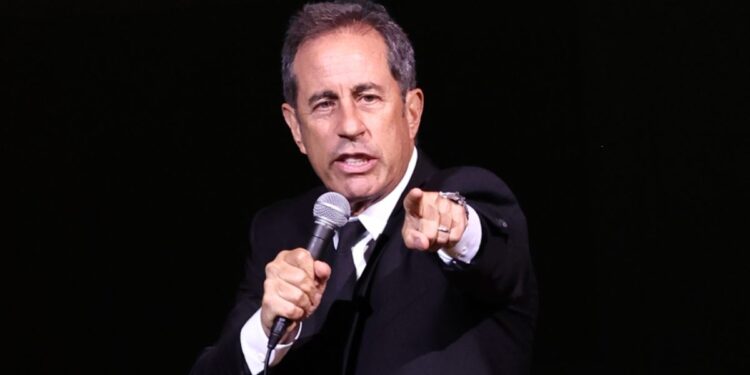Jerry Seinfeld, in an interview with The New Yorker, expressed his views on the decline of television comedy. According to him, the rise of “P.C. crap” and the influence of the “extreme left” have contributed to the extinction of this genre. Seinfeld, known for his iconic sitcom that aired from 1989 to 1998, believes that the traditional way of consuming comedy through television sets has changed.
According to Seinfeld, comedy remains unaffected by external factors and continues to be a necessity for people. He believes that people have a strong need for comedy, but unfortunately, it is not readily available. In the past, people could rely on popular TV shows like “Cheers,” “MASH,” “Mary Tyler Moore,” or “All in the Family” to provide them with humor. However, the current lack of funny content on television is a consequence of excessive political correctness and people’s fear of offending others.
Comedy fans nowadays flock to stand-up shows, as Jerry Seinfeld points out, because there’s no external policing involved. Instead, it’s the audience who determines whether a comedian is on the right track or not. The feedback is instant, and as comedians, they are quick to adjust to it. In contrast, when it comes to writing scripts, the process involves multiple hands, committees, and groups, all offering their input and opinions. Unfortunately, this kind of collaboration often stifles the comedic essence, putting a damper on the humor.
“We did an episode of [‘Seinfeld’] in the nineties where Kramer decides to start a business of having homeless people pull rickshaws because, as he says, ‘They’re outside anyway,'” he went on to remark. “Do you think I can get that episode on air today?” We’d make a new joke with Kramer and the rickshaw today. We would not make that joke. We would make up another joke. They move the gates as if in a slalom. Culture’s gates are moving. Your job is to be agile and cunning enough to create a gate wherever they put it.
Seinfeld went on to say that “stand-ups” today “really have the freedom” to cross the line when it comes to humor, implying that television networks are no longer interested in producing anything that will ruffle feathers and anger the P.C. audience.
With his Netflix film “Unfrosted” slated to premiere in May, Seinfeld has been making the rounds in the press for a few weeks, sharing his candid thoughts on the condition of Hollywood. In a recent interview with GQ magazine, he declared that “the movie business is over.”.
“Film doesn’t occupy the pinnacle in the social and cultural hierarchy that it did for most of our lives,” he told me. “When a good film came out, we all flocked to see it. We’ve all talked about it. We quoted sentences and scenes that we appreciated. Now we’re walking through a firehose of water, just to see.”
So, what, if anything, has succeeded in film? ” Depression? Malaise? I’d say confused. “Disorientation replaced the movie business,” Seinfeld replied. “Everyone I know in show business asks, ‘What’s going on?’ “How do you do it? “What are we supposed to do now?”










